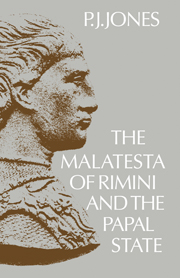Book contents
- Frontmatter
- Contents
- Dedication
- Preface
- Abbreviations
- Map of Romagna and the Marche in the later Middle Ages
- 1 The Papal State and Romagna in the thirteenth century
- 2 Rimini and the rise of the Malatesta
- 3 From commune to papal vicariate
- 4 Galeotto Malatesta, ‘ecclesie pugil’
- 5 The prime of Malatesta rule: Carlo Malatesta
- 6 The pontificate of Martin V
- 7 Sigismondo Pandolfo Malatesta, ‘fex Italiae’
- 8 The papal reconquest
- 9 The government of the Malatesta: I. The papal vicariate
- 10 The government of the Malatesta: II. The signoria
- Appendix
- Bibliography
- Index
3 - From commune to papal vicariate
Published online by Cambridge University Press: 23 December 2009
- Frontmatter
- Contents
- Dedication
- Preface
- Abbreviations
- Map of Romagna and the Marche in the later Middle Ages
- 1 The Papal State and Romagna in the thirteenth century
- 2 Rimini and the rise of the Malatesta
- 3 From commune to papal vicariate
- 4 Galeotto Malatesta, ‘ecclesie pugil’
- 5 The prime of Malatesta rule: Carlo Malatesta
- 6 The pontificate of Martin V
- 7 Sigismondo Pandolfo Malatesta, ‘fex Italiae’
- 8 The papal reconquest
- 9 The government of the Malatesta: I. The papal vicariate
- 10 The government of the Malatesta: II. The signoria
- Appendix
- Bibliography
- Index
Summary
With the election of Bertrand de Got as pope in 1305 began the long exile of the papacy from Italy, during which the Malatesta of Rimini and other ‘tyrampni’ of the States of the Church were to consolidate their power. Though moved to the frontiers of the French kingdom, ruled by a succession of French pontiffs, and subject to the persistent pressures of French policy, the papacy of Avignon in no way relaxed its interest in Italy, or in the immunities and government of the Papal State. On the contrary, Italy and the Papal State remained throughout its first concern. The laconic testimony of papal finance would suffice to prove this, were there not also the last great struggle of papacy and empire, in which once again care for the autonomy of the States of the Church is seen to predominate. As before, the relations of pope and emperor turned upon Italy, and not until the middle of the fourteenth century was the imperial threat finally removed. Not only did the German kings revive their inherited Italian claims; they also meddled in the territories of Rome. Clement V had to warn Henry of Luxemburg against interference in Bologna, and in 1313, as the quarrel developed between the emperor and Robert of Naples, Henry declared his enemy dispossessed of all titles and offices, including the rectorate of Bologna and Romagna, which he pronounced subject to imperial jurisdiction. This renascent Hohenstaufen policy was carried still further by Lewis of Bavaria who invaded the Papal State and challenged its autonomy.
- Type
- Chapter
- Information
- The Malatesta of Rimini and the Papal State , pp. 42 - 78Publisher: Cambridge University PressPrint publication year: 1974



